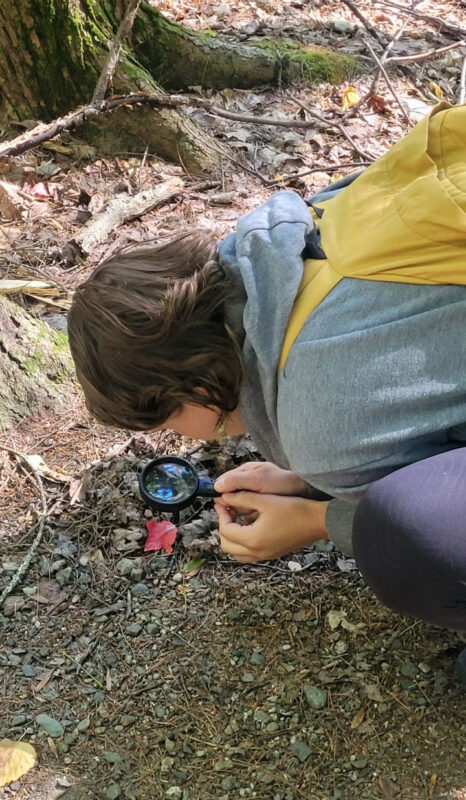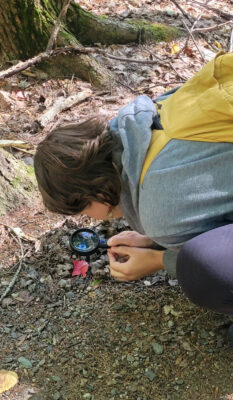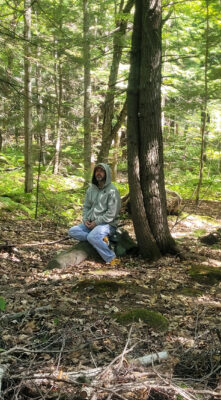
What is Forest Therapy?
Eons ago, humans and Nature were deeply interconnected. They relied on each other. Cortisol, a stress hormone, was only involved in fight or flight situations, such as running from a saber-toothed tiger. In today’s world, cortisol is in constant use, because people are chronically stressed out due to the demands of society and technology. Regular Forest Therapy reduces cortisol and boosts the immune system.
Forest Therapy is based on the Japanese practice of “Shinrin Yoku,” which emerged in the 1980’s. The term translates to “taking in the atmosphere of the forest” or “forest bathing.”
Thus, Forest Therapy is the practice of spending time in Nature, bathing in the atmosphere of the forest. The intention is to connect with Nature in ways that heal both people and Nature. It involves slowly and mindfully moving through the landscape, using one’s sense of taste, smell, touch, sight, and hearing. By opening one’s senses, one communicates with Nature and they learn to let the messages Nature has for us into our minds.
Certified Forest Therapy guides offer invitations throughout the walks that are designed to get people to slow down and open their senses. When people get out of their “monkey brains,” over time they start developing meaningful relationships with Nature and that is where our healing starts. We receive healing from the trees, animals, plants, waters, etc. and, in turn, we are more likely to reciprocate on an ecological level. This feeling of oneness- of interconnectedness is a win-win for both. The Forest is the therapist; the Guide opens the doors (to the senses).

Benefits of Forest Therapy
- Reduces stress hormone production (cortisol)
- Improves feelings of happiness and creativity
- Decreases heart rates and blood pressure
- Boosts the immune system
- Speeds recovery from illness
- Decreases stress, anxiety, and depression
- Improves sleep and mental clarity
Photo Gallery
What’s a Forest Therapy Walk like you ask?
Look and see for yourself. We notice as much as we can and discover so much about …
A Forest Therapy walk starts out with a simple meditation, bringing you into awareness of your body and getting you out of your head. Then there is a slow meander in the woods or any natural setting where the guide offers a few invitations for activities that help you open your senses to the world around you. An activity is as simple as exploring what is in motion around you to sitting on the ground taking in the scents of the forest. After each invitation, there is the opportunity to share something you have noticed— if you want to. A typical guided Forest Therapy walk takes about 2-3 hours and is within walking distance of up to a mile. The walk culminates with Tea provided by the forest and snacks. Any person, regardless of disability, can participate. The guide needs to know if a participant has a disability so that modifications can be made to the walk.
Meet Your Guide
Kandi grew up in Wilton, Maine. She spent much of her childhood outdoors, making mud pies, climbing trees, catching and releasing frogs, toads, and salamanders, fishing, and exploring the woods behind her house and the family camp with her brothers and sister. Her parents would pile her and her 3 siblings into the car and take off to drive old tote roads and this continues to be a favorite pastime of hers.
As a young adult, she continued to spend time in the outdoors, camping with her young daughter and panning for gold in the Swift River of Western, Maine. Her former husband, John, introduced her to mining for gemstones and hunting and since then she has harvested deer, moose, bear, grouse, turkey, and a goose for food. They drove old totes roads just to see what was over the next ridge and to search for oyster mushrooms and chaga.
Kandi has been on wilderness canoe and camping trips with Mahoosic Guide Service. She enjoys learning new outdoors skills at Maine Primitive School, Maine’s Outdoor Learning Center (MOLC), and going on all women’s hunting and fishing trips with the women of Maine Women Hunters.
She studied herbalism with Dr. Nathaniel Petley and enjoys foraging for herbs, with which she makes soaps, and salves, and tinctures.
In 2019 she studied with MOLC to learn the skills needed to become a Maine Guide. In 2019 and 2020, she became a Registered Maine Guide for Recreation and Hunting. Kandi is certifed in Wilderness First Aid.
Kandi has worked for North Country Associates for the past 36 years, as a cook, foodservice director, and now as a registered and licensed dietitian. She is the Nutrition Services Coordinator overseeing the Food and Nutrition Departments of long-term care facilities in Maine.
The healthcare world is stressful, especially since the advent of Covid. Noticing how her stress dissipated whenever she was out in the woods, Kandi applied to the Association of Nature and Forest Therapy (ANFT) to become a Certified Forest Therapy guide. Now she uses her ANFT certification, the skills she learned as a Registered Maine Guide, and her love of the Forest to open the doors to Nature so that others may benefit physically, mentally, and spiritually through their connections with Nature.
Join Kandi and immerse yourself in all that Nature has to offer you. Each walk takes 2 to 3 hours because they are very slow – it is all about the journey, rather than the destination. She conducts walks in Wilton, Maine on forested land stewarded by her partner Nathan. She also guides walks in Farmington and other areas of Western Maine.

Scheduling & Sessions
To schedule a walk, call or email.
A typical guided Forest Therapy walk takes about 2-3 hours and is within walking distance of up to a mile. Most walks are done in and around Harden Woods, Wilton, Farmington, and western Maine.
Other locations by arrangement, including your own land.
Prices
Single Adult = $40
Family (1 adult and 1 child) = $50
Additional child = $5
Group Rate (5 or more) = $30 per person

Contact
reconnectwithnatureandyourself@yahoo.com
(207) 754–0742 or send an email using the form below.
Liability Forms
Participant Agreement, Release, and Assumption of Risk Form (single participant)
Participant Agreement, Release, and Assumption of Risk Form (multiple participants)




































































